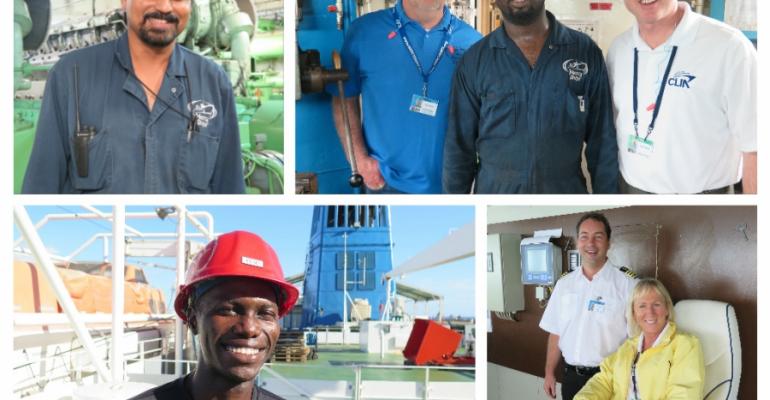Aboard the floating hospital Africa Mercy, that's the case. Not just for the devoted doctors, nurses and other medical personnel who perform life-changing surgeries in some of the world's neediest countries but also for the captain and chief engineer down to the deck hands and motormen.
In fact, Mercy Ships—the charity of choice for Cruise Lines International Association and a cause for Pullmantur Cruises and cruise ship supplier Four Winds Interactive—also serves as a training ground for seafarers. Apart from their work, they can get training on board toward earning licenses that give them the opportunity to land good jobs in commercial shipping.
For example, Africa Mercy engine room volunteer Osman Kamura of Sierra Leone as a youngster had plastic surgery performed by Mercy Ships. He's working toward his motorman certificate and then could go on to become an engineer.
When CLIA's Cindy D'Aoust, president and ceo, and Donnie Brown, director of technical and regulatory affairs, environmental and health, visited Africa Mercy in Madagascar earlier this year, they met Kamura busy at work in the engine room.
And Oluwafemi Adesanya of Nigeria was serving as a deck hand while training and studying for his able seaman's license as he follows his dream of becoming a deck officer and working as a safety officer.
'One of the problems we have in Africa is a lack of education,' Adesanya said. 'I found out Mercy Ships has training to become a ship's officer with a license recognized internationally. With that I can get a very lucrative job. I can take care of my family and neighbors.'
Adesanya first volunteered for Mercy Ships during its mission in Benin in 2009. (Africa Mercy is returning there for its next deployment this year.) He had studied communications in Nigeria and worked as a teacher but had no seafarer training.
'I only came with a heart to serve,' he said. 'I loved it. Everyone was happy and helping people.'
In his more recent stint aboard Africa Mercy in Madagascar, Adesanya expected to complete his able seaman's course. He's also had training aboard ships in South Africa and Spain, and studied online and at Maritime Professional Training in Fort Lauderdale.
One challenge is that Africa Mercy doesn't sail very often—it stays alongside in each country for months. Adesanya has managed to cobble together 24 months at sea toward the 36 months he needs. He hopes to find jobs on other vessels to put into practice what he's learned on Africa Mercy and make some money.
The money isn't the goal, he added. His goal is a first officer's license.
'I am very, very grateful to God and to Mercy Ships for this opportunity,' Adesanya told Seatrade Cruise News. 'Mercy Ships supports people, especially Africans who have fewer opportunities. I would be proud to say I am an officer and it all started with Mercy Ships.'
Adesanya, like all the 400 crew from about 40 nations who serve on Africa Mercy, also pays his own travel expenses and room and board.
Capt. Jan Tuinier raised €18,000 from church, family and friends back home in the Netherlands to support himself, his wife and their young daughter for a year on board. That paid crew fees, insurance and school fees for their daughter in the ship's classes, taught by licensed volunteer teachers.
Though Africa Mercy spends far more time in port than at sea, the captain and his crew maintain the Malta-flagged vessel in full compliance with international regulations.
Tuinier called training 'my passion. I love it.' He said training is ongoing, with part of each day spent in STCW courses like navigation and firefighting.
The captain proudly told how day workers from host countries have achieved maritime licenses and gone on to jobs aboard commercial ships, making good money. He's glad Mercy Ships can provide 'well-trained, very motivated guys' to work in commercial seafaring and become 'pillars of their generation.'
Born near Rotterdam, the captain went to maritime college in the Netherlands and first worked in inland shipping. He holds an unlimited master's license for the Rhine. He volunteered as a deck hand aboard the former Mercy Ships vessel Caribbean Mercy in 2001.
'That changed my life completely,' he said. 'I saw a very practical Christianity.'
Tuinier studied in the UK for his deep sea licenses and sailed for several years on commercial vessels, advancing up through the ranks, while also volunteering for Mercy Ships. He took command of Africa Mercy as captain last September.
Recently Tuinier finished his service on board when the ship completed its 10-month stint in Madagascar. In June he commanded Africa Mercy's transit to Durban, South Africa, where it's undergoing work before deploying to Cotonou, Benin.
Tuinier, however, has gone on to a new calling—at Cups of Cold Water, a charity in Sosua, Dominican Republic, his wife's home country.
(For more about Mercy Ships, see a feature story in the latest issue of Seatrade Cruise Review.)
Copyright © 2024. All rights reserved. Seatrade, a trading name of Informa Markets (UK) Limited. Add Seatrade Cruise News to your Google News feed.


